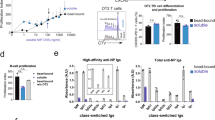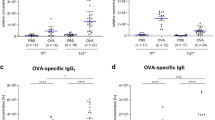Abstract
BCG can either act as an adjuvant to potentiate immunological responses or, in some cases, can induce suppression. The reasons for these differential activities are not clear but may include routes and doses of administration, as well as variable host reactivity to the agent. In this study, we have used killed BCG administered intravenously to produce chronic granulomatous inflammation (CGI) in the lungs and spleen of inbred mice. We report that strains which developed CGI were usually anergic, as evaluated by the development of delayed hypersensitivity (DH) to sheep erythrocytes (SRBC). Studies on the genetics of BCG-induced anergy indicated that it was unigenic, recessive and linked (approximately 28 recombination units) to the immuno-globulin heavy-chain allotype (Igh). There was no influence by genes linked to the major histocompatibility complex. The study indicates that anergy associated with CGI is under genetic control, which may explain the variability of anergy in patients with granulomatous diseases. The implication of linkage to the Igh complex is not clear, but it may be associated with VH receptors on T lymphocytes, which in turn act on macrophages to mediate suppression.
This is a preview of subscription content, access via your institution
Access options
Subscribe to this journal
Receive 51 print issues and online access
$199.00 per year
only $3.90 per issue
Buy this article
- Purchase on Springer Link
- Instant access to full article PDF
Prices may be subject to local taxes which are calculated during checkout
Similar content being viewed by others
References
Galindo, B. & Myrvik, Q. N. J. Immun. 105, 227–237 (1970).
Allen, E. M., Moore, V. L. & Stevens, J. O. J. Immun. 119, 343–347 (1977).
Allen, E. M. & Moore, V. L. J. reticuloendothel. Soc. 26, 349–356 (1979).
Schner, D. J., Allen, E. M. & Moore, V. L. Fedn Proc. 38, 1174 (1979).
Moore, V. L., Schrier, D. J., Sternick, J. L. & Allen, E. M. in Basic and Clinical Aspects of Granulomatous Inflammation (eds Boros, D.L. & Yoshida, T.) (Elsevier, New York, in the press).
Coulis, P. A., Lewert, R. M. & Fitch, F. W. J. Immun. 120, 1074–1076 (1978).
Klimpel, G. R. & Henney, C. S. J. Immun. 120, 563–569 (1978).
Kirchner, H., Chused, T. M., Herberman, R. B., Holden, H. T. & Lavrin, D. H. J. exp. Med. 139, 1473–1487 (1974).
Allen, E. M., Calvanico, N. J. & Moore, V. L. Fedn Proc. 38, 1174 (1979).
Tadakuma, T. & Pierce, C. W. J. Immun. 120, 481–486 (1978).
Ptak, W., Zembala, M. & Gershon, R. K. J. exp. Med. 148, 424–434 (1978).
Eardley, D. D., Shen, F. W., Cantor, H. & Gershon, R. K. J. exp. Med. 150, 44–50 (1979).
Weinberger, J. Z., Greene, M. I., Benacerraf, B. & Dorf, M. E. J. exp. Med. 149, 1336–1348 (1979).
Author information
Authors and Affiliations
Rights and permissions
About this article
Cite this article
Schrier, D., Sternick, J., Allen, E. et al. Genetic basis of BCG-induced suppression of delayed hypersensitivity. Nature 289, 405–407 (1981). https://doi.org/10.1038/289405a0
Received:
Accepted:
Issue Date:
DOI: https://doi.org/10.1038/289405a0
This article is cited by
-
Genetic architecture of tuberculosis resistance in a mouse model of infection
Genes & Immunity (2006)
-
Mouse Chromosome 12
Mammalian Genome (1992)
-
Genetic aspects of innate resistance and acquired immunity to mycobacteria in inbred mice
Springer Seminars in Immunopathology (1988)
-
The immunologic and immunotherapeutic sequelae of intraperitoneal BCG
Irish Journal of Medical Science (1983)
-
The immunologic and immunotherapeutics equelae of intraperitoneal BCG
Irish Journal of Medical Science (1983)
Comments
By submitting a comment you agree to abide by our Terms and Community Guidelines. If you find something abusive or that does not comply with our terms or guidelines please flag it as inappropriate.



